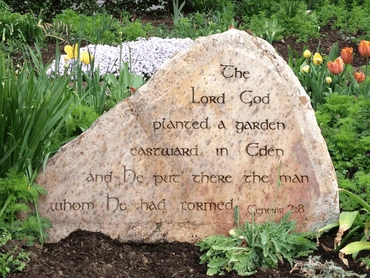Explanation of Genesis 2:16
By Brian David

In the Bible, eating represents taking in knowledge and the desire for good. Trees represent knowledge and understanding that come from the Lord. So this verse says the people of the Most Ancient Church – "man" or "Adam" – were free to gather the knowledge that flowed to them from the Lord.
This happened in a way that we cannot truly understand now. Because the people of the Most Ancient Church were in a state of love to the Lord, they know instantly, from their affections, what was true. They didn't have to ponder logic and ask questions; they simply knew from their emotional response whether an idea was in accord with love to the Lord.
(References: Arcana Coelestia 0125)
Arcana Coelestia #8935
8935. An altar of ground thou shalt make unto Me. That this signifies a representative of worship in general from good, is evident from the signification of “an altar,” as being the principal representative of the Lord, and consequently of the worship of Him (see n. 921, 2777, 2811, 4489, 4541); and from the signification of “ground,” as being good. That “ground” denotes good is because by “ground” is signified the church which is in good (n. 566). Hence Adam was said to be “from the ground” (Genesis 2:7; 3:19), for by him was signified the man of the celestial church, or the church which is in good (n. 478, 479). There are two things from which the worship of the Lord is effected; good and truth. Worship from good was represented by an altar of ground, but worship from truth was represented by an altar of stones; both kinds of altars are here treated of. These two things from which worship is effected are called faith and charity; worship from truth bears relation to faith, and worship from good to charity. As regards worship from faith and worship from charity, or from truth and from good, the case is this. Before a man is regenerated he is in worship from truth, but when he has been regenerated, he is in worship from good. For before a man has been regenerated he is led by means of truth to good, that is, by means of faith to charity; but when he has been regenerated he is in good and thence in truth; that is, he is in charity and thence in faith (n. 8516, 8539, 8643, 8648, 8658). These two kinds of worship are what are represented by altars of ground and of stone. (That an altar is the chief representative of the worship of the Lord, because thereon were made burnt-offerings and sacrifices, and these were the things in which the Divine worship of the Hebrew nation, and thus of the Israelitish and Jewish nation, chiefly consisted, see n. 923, 1343, 2180, 2805, 2807, 2830, 3519, 6905)






